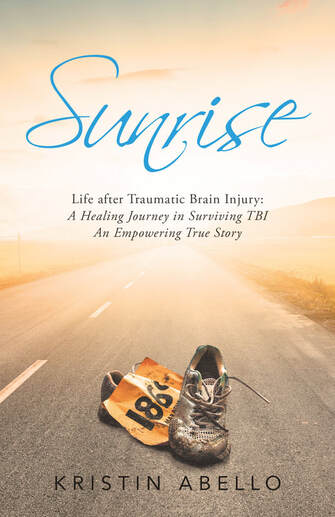Play & Book Excerpts
Sunrise:
Life After Traumatic Brain Injury
(Archway Publishing)
© Kristin Abello
Ch. 7: Healing
The doctor preferred to work with my body’s pace. He believed my waking from the coma was a feat, so it was best to let my body set its own rhythm.
I was soon riding the recumbent bike a minute a day, then five minutes, and on to ten. Baby steps it was to my new normal. I also remember working with some blue balance balls. There were benchmarks for recovery, like putting on your shirt or brushing your teeth. I had occupational therapy sessions, physical therapy, speech therapy, every type of therapy that one could imagine. It was a detailed schedule that I followed.
One interesting thing with TIRR [The Institute for Rehabilitation and Research] was that you didn’t have your own room. The first person I shared a room with was a lady who had suffered a stroke while giving birth. I remember that she and her husband were usually quiet and peaceful. The “normal me” would have been friendly and asked how I could be of help to them. But at this point in my recovery, I had no energy to do so. It all had been sucked out of me, trying to be human again. One evening, my phone fell on the tiled floor with a loud crash and the husband immediately called out, “Are you okay?”
“Yes,” I replied, “thanks.”
The second person was a sweet, older lady who fell and hit her head while riding a bike. I don’t remember guests coming in to visit her. She would groan miserably at night from the pain, much like the people yelling down the hall at all times of the day. It was a center for patients at all levels of pain and challenge.
Three weeks into TIRR I was scheduled for bingo games with the nurses and other patients. I could see it was a bright and sunny morning though the wide horizontal window to my left. A nurse had scribbled my activities for the day on a white board, and I recall watching her from my twin-size bed and thinking that these people needed to give me a break. In reality my duties were as simple as waking up, eating, and doing physical therapy, and usually afterwards I would pass out, as my brain had to continuously reconnect my broken pathways.
Bingo was to be held in a separate room, down the hall. I didn’t want to go and told Jeri. Thankfully she understood me, but Mom had a different idea. She wanted us to follow the doctor’s orders and made my friend wheel me to bingo. A nurse told Jeri to wait outside, as no family or friends were allowed in the games. It was only the nurses with patients. I stared at Jeri as she quickly walked toward the door. She waved goodbye while shrugging her shoulders and looked at me with hopelessness in her eyes, in disbelief that she had to leave. She had known I had wanted her to stay. I had thought she would maybe be able to convince the nurses that I didn’t need to be there.
I joined the group of several other patients. We sat around two joined rectangular tables. Everyone seemed a little behind. They talked at kindergarten level. Things were not matching up.
Why am I here? I thought.
I had yet to comprehend the severity of my state.
There was a man across from me having a hard time finding an image of the sunshine on his bingo card. The nurse had just called out in a bright voice, “And who has the sunshine?”
Okay this was bad. The man with the sunshine card was my age, but for some reason he was acting like a five-year-old. What was going on? Mom said I was in a bad accident. I squinted around the room. I must’ve been way worse than I thought.
“Who has blue socks on their bingo card?” The nurse slowly enunciated each word as she kept flipping her long blonde hair to the side.
Another guy across from me was getting very excited. He just realized he had the blue sock picture on his card.
There was no background music. The room was cold and stale. Sterile. It was silent except for the voice of either the nurse or her assistant. They must have set the bingo cards on the tables before we entered. One patient started laughing, a few were super excited, and a couple were really quiet.
I was one of the really quiet ones.
The doctor preferred to work with my body’s pace. He believed my waking from the coma was a feat, so it was best to let my body set its own rhythm.
I was soon riding the recumbent bike a minute a day, then five minutes, and on to ten. Baby steps it was to my new normal. I also remember working with some blue balance balls. There were benchmarks for recovery, like putting on your shirt or brushing your teeth. I had occupational therapy sessions, physical therapy, speech therapy, every type of therapy that one could imagine. It was a detailed schedule that I followed.
One interesting thing with TIRR [The Institute for Rehabilitation and Research] was that you didn’t have your own room. The first person I shared a room with was a lady who had suffered a stroke while giving birth. I remember that she and her husband were usually quiet and peaceful. The “normal me” would have been friendly and asked how I could be of help to them. But at this point in my recovery, I had no energy to do so. It all had been sucked out of me, trying to be human again. One evening, my phone fell on the tiled floor with a loud crash and the husband immediately called out, “Are you okay?”
“Yes,” I replied, “thanks.”
The second person was a sweet, older lady who fell and hit her head while riding a bike. I don’t remember guests coming in to visit her. She would groan miserably at night from the pain, much like the people yelling down the hall at all times of the day. It was a center for patients at all levels of pain and challenge.
Three weeks into TIRR I was scheduled for bingo games with the nurses and other patients. I could see it was a bright and sunny morning though the wide horizontal window to my left. A nurse had scribbled my activities for the day on a white board, and I recall watching her from my twin-size bed and thinking that these people needed to give me a break. In reality my duties were as simple as waking up, eating, and doing physical therapy, and usually afterwards I would pass out, as my brain had to continuously reconnect my broken pathways.
Bingo was to be held in a separate room, down the hall. I didn’t want to go and told Jeri. Thankfully she understood me, but Mom had a different idea. She wanted us to follow the doctor’s orders and made my friend wheel me to bingo. A nurse told Jeri to wait outside, as no family or friends were allowed in the games. It was only the nurses with patients. I stared at Jeri as she quickly walked toward the door. She waved goodbye while shrugging her shoulders and looked at me with hopelessness in her eyes, in disbelief that she had to leave. She had known I had wanted her to stay. I had thought she would maybe be able to convince the nurses that I didn’t need to be there.
I joined the group of several other patients. We sat around two joined rectangular tables. Everyone seemed a little behind. They talked at kindergarten level. Things were not matching up.
Why am I here? I thought.
I had yet to comprehend the severity of my state.
There was a man across from me having a hard time finding an image of the sunshine on his bingo card. The nurse had just called out in a bright voice, “And who has the sunshine?”
Okay this was bad. The man with the sunshine card was my age, but for some reason he was acting like a five-year-old. What was going on? Mom said I was in a bad accident. I squinted around the room. I must’ve been way worse than I thought.
“Who has blue socks on their bingo card?” The nurse slowly enunciated each word as she kept flipping her long blonde hair to the side.
Another guy across from me was getting very excited. He just realized he had the blue sock picture on his card.
There was no background music. The room was cold and stale. Sterile. It was silent except for the voice of either the nurse or her assistant. They must have set the bingo cards on the tables before we entered. One patient started laughing, a few were super excited, and a couple were really quiet.
I was one of the really quiet ones.
|
Advocate, philanthropist, and writer Kristin Abello has made it her life’s mission to share her story with the world and is passionate about changing the narrative of the TBI (Traumatic Brain Injury) community. Although every injury is different, there is a common thread that with faith, prayer and support, proper healing can take place.
Kristin and her husband, Raul, are the parents of two wonderful boys, Jacob and Colin, and they currently reside in the city of Houston, Texas, with their Golden Retriever, Lucy. |
Photo Courtesy: Kristin Abello
|




